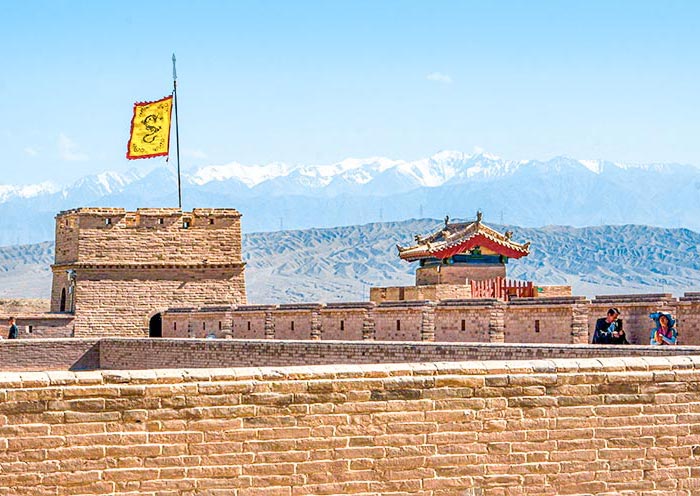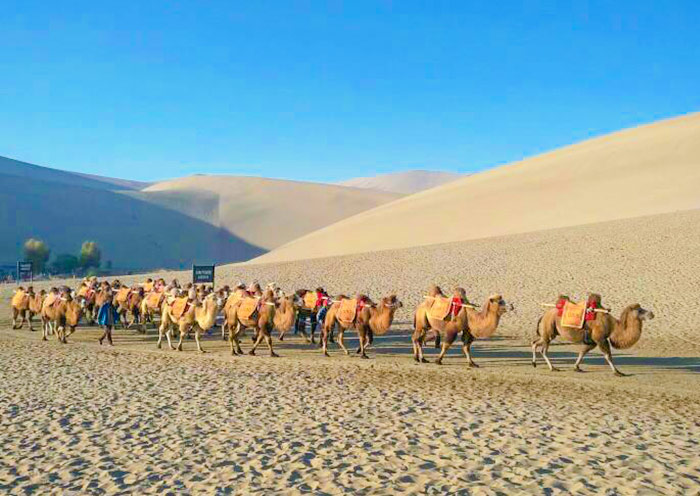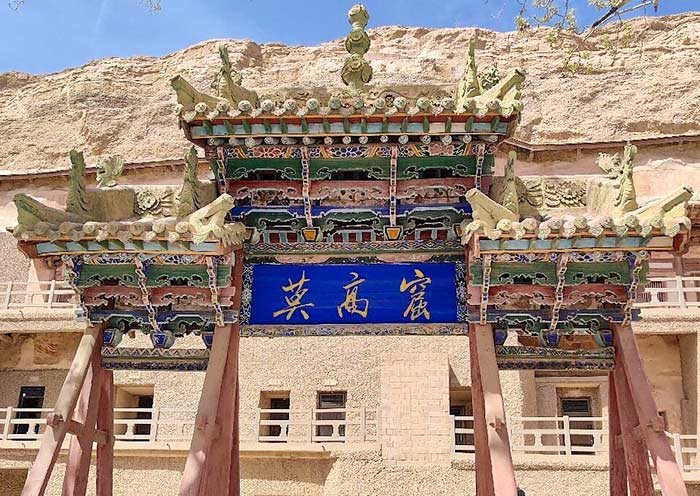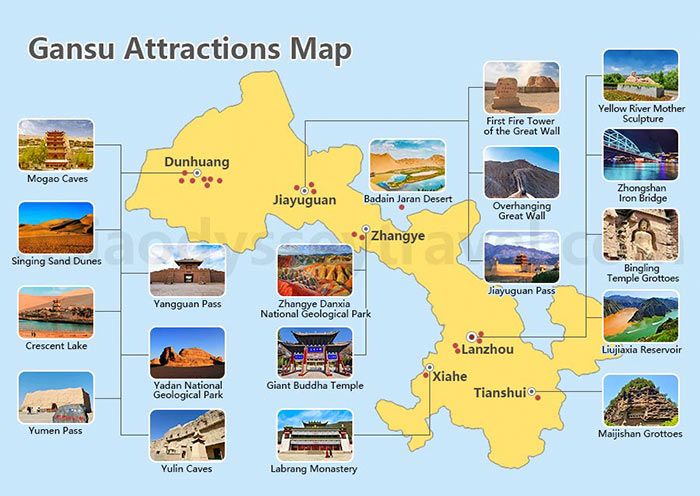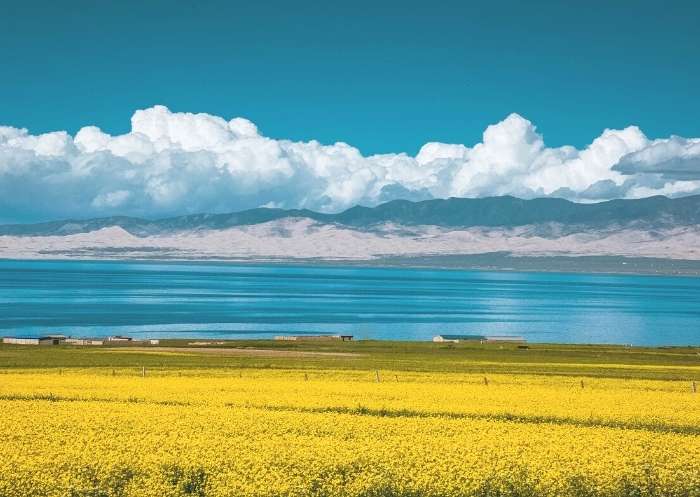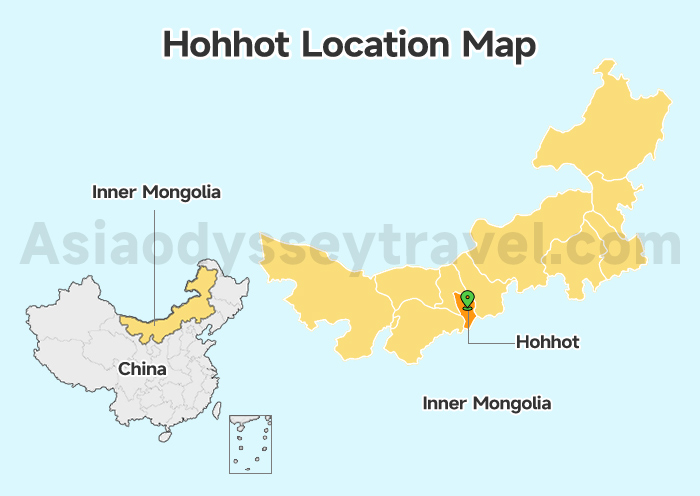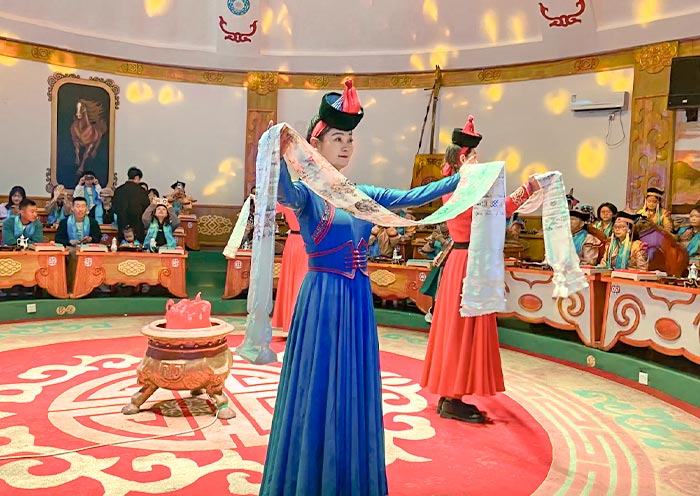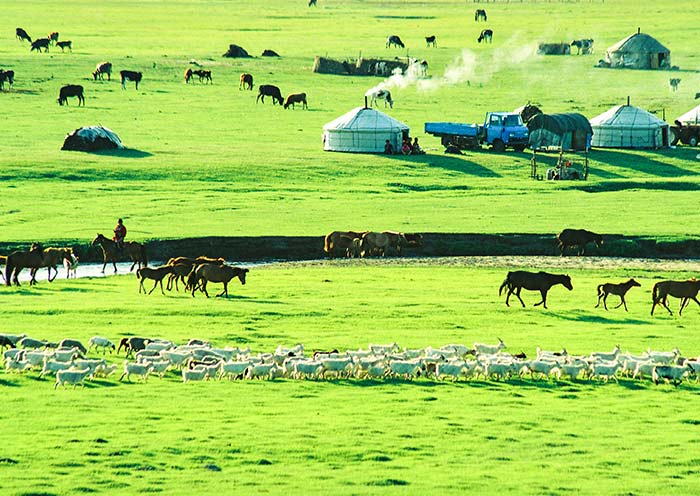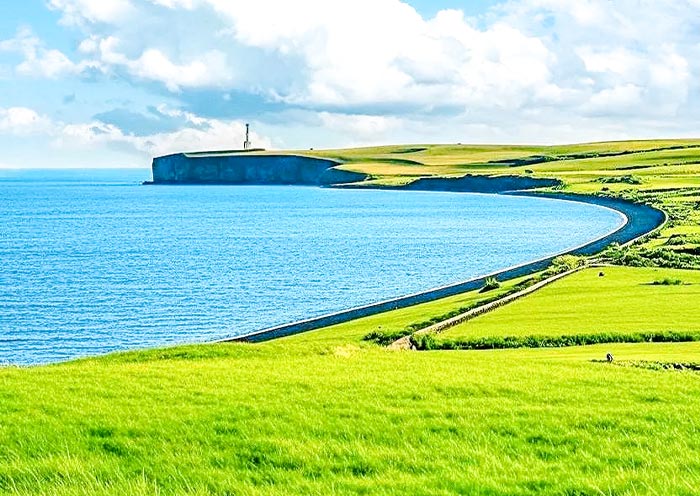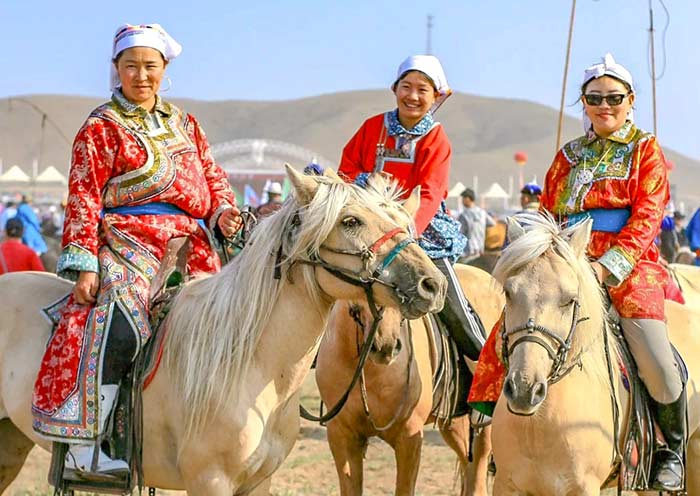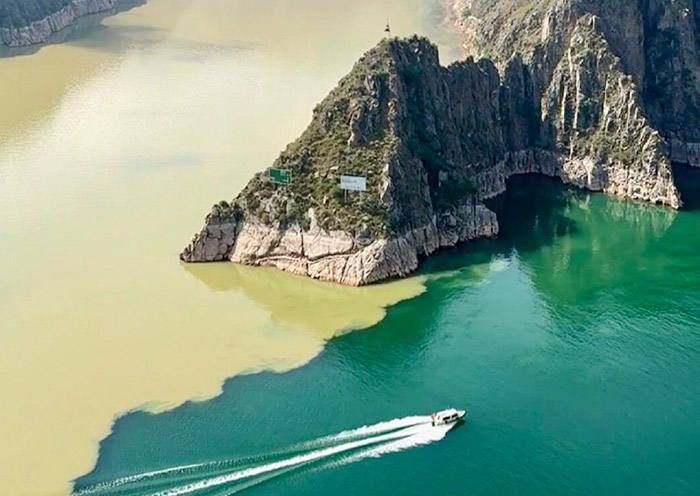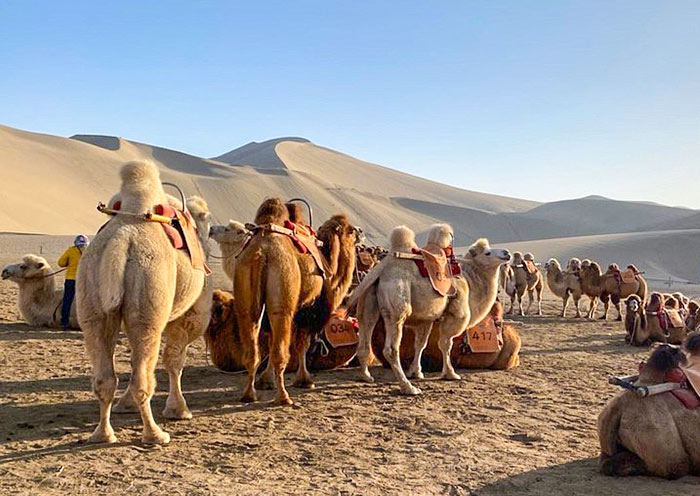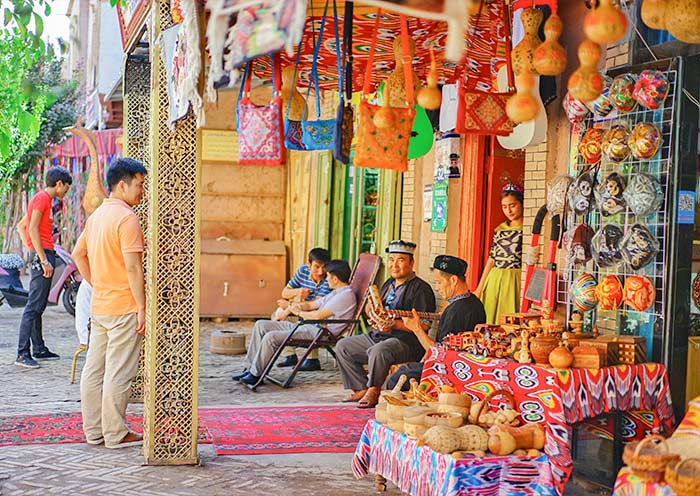Badain Jaran Desert Facts
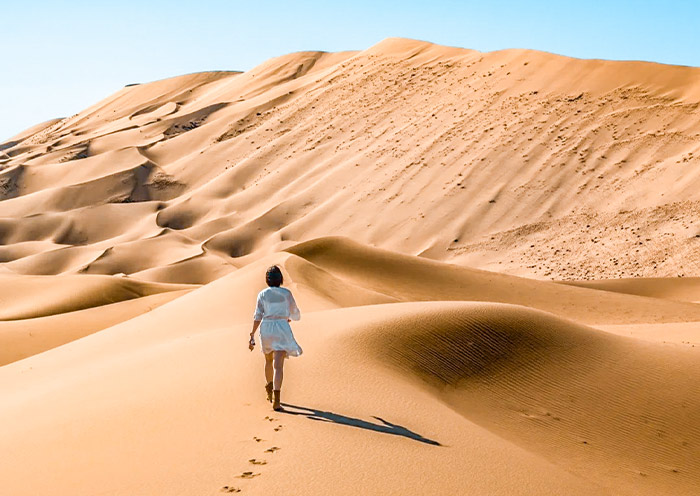
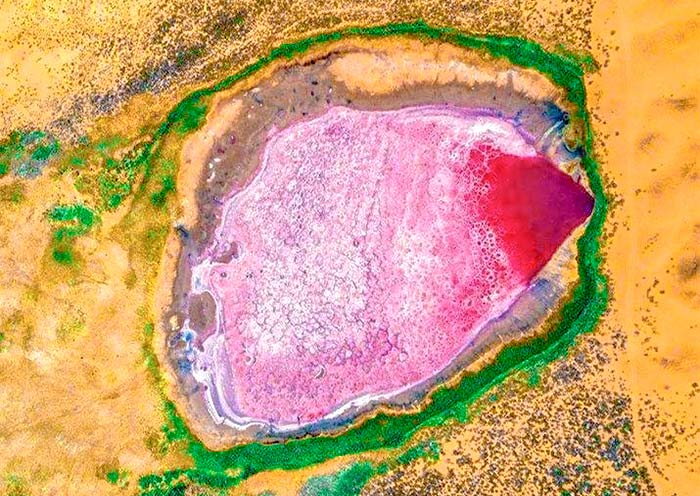
Chinese name: 巴丹吉林沙漠
Location: Located in the north-central part of China, mostly within the Inner Mongolia Autonomous Region.
Size: Over 49,000 square kilometers, making it the third largest desert in China.
Wildlife: Hosts unique wildlife, including the Bactrian camel and Mongolian gazelle.
Visiting Time: 1-2 days.
How Was the Badain Jaran Desert Lakes Formed
The lakes in the Badain Jaran Desert form from underground water that seeps from distant mountains. This water is trapped by non-porous rock and clay under the desert, creating lakes. Despite the dry surroundings, these lakes last because the tall sand dunes around them keep the area cool and reduce water evaporation.
The vibrant colors of the lakes in the Badain Jaran Desert are formed by a mix of dissolved minerals, algae, sediment types, and varying light conditions, each contributing to the unique hue of each lake.
Why Visit Badain Jaran Desert
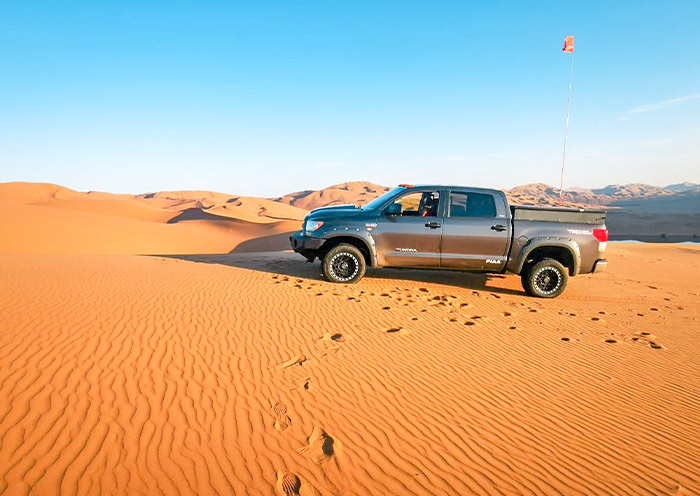
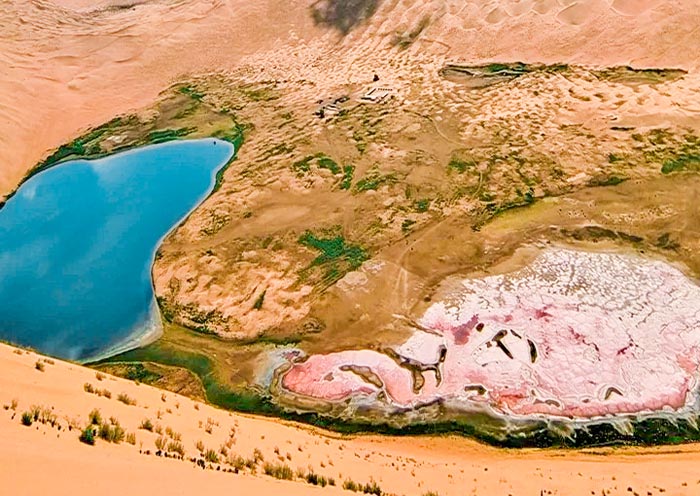
The Badain Jaran Desert isn't just a place to visit; it's an experience packed with natural wonders and mysteries, making it a bucket list destination for the adventurous, the curious, and the spiritually inclined. Ready to explore?
- A Desert of Extremes: Not just any desert, Badain Jaran is the third largest in China, sprawling over a whopping 49,000 square kilometers. It's a vast sea of sand, punctuated by some of the tallest stationary sand dunes on the planet. The king of these dunes, Bilutu Peak, towers around 1,640 feet above the desert floor.
- Mystery Lakes: Imagine over 100 sparkling lakes scattered across a desert. Sounds surreal, right? These aren't tiny puddles; we're talking about large, permanent bodies of mostly fresh water, defying the arid surroundings and baffling scientists.
- The Sands that Sing: This desert has a soundtrack—thanks to its famous "singing sands". Under the right conditions, the moving sands hum deep, eerie tunes that you have to hear to believe.
- Sacred Temples: Amid these mysterious landscapes, you'll find the serene Badain Jaran Temple, a beacon of Tibetan Buddhism. It's a place where spiritual vibes and the stark beauty of the desert meet.
- Desert Dwellers: This harsh environment is home to resilient wildlife like the Bactrian camel and Mongolian gazelle, not to mention various birds thriving near the lakes.
What to See in Badain Jaran Desert?
Lakes of the Badain Jaran Desert - Highlights of Badain Jaran Desert
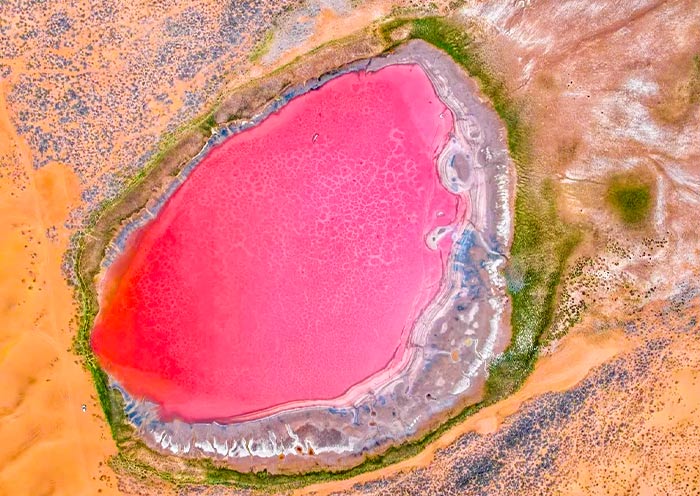

The beautiful, colorful lakes are absolutely the highlight of the Badain Jaran Desert. Scattered across the desert are over 100 permanent lakes, each flaunting its own unique color palette—from crystal clear, to shades of blue and green, and even pink and red. Believe it or not, some lakes even sport two colors, offering a truly stunning visual spectacle. Plus, these lakes come in quirky shapes too, some looking like alien eyes, while others resemble rabbits. Trust me, these lakes are a feast for the eyes and are sure to leave you in awe.
Most Famous and Beautiful Lakes of Badain Jaran Desert:
Temple Lake (庙海子): Surrounded by sand dunes, this lake sees only a few millimeters of rain annually, with evaporation rates far exceeding precipitation. Despite its high salinity, the lake never dries up nor gets buried by sand.
Norbu Lake (诺尔图湖): This is the largest lake in the Badain Jaran Desert, covering an area of 1.4 square kilometers.
Yinderitu (音德鲁图): Known as the "Divine Spring," this spot boasts 108 spring eyes. The water contains a variety of elements essential to the human body and is said to be particularly effective for treating stomach ailments.
Red Lake (红海子): An incredibly beautiful and striking red-colored lake.
Twin Lakes (双海子): This unique body of water features both pink and blue hues.
Shaobai Jilin (少白吉林): Shaped like an alien's eye, this lake dazzles in shades of green and blue.
Badain Lake (巴丹湖): Part of a stunning group of lakes in the Badain Jaran Desert, each offering breathtaking views.
Where is the Lakes in Badain Jaran Desert Located?
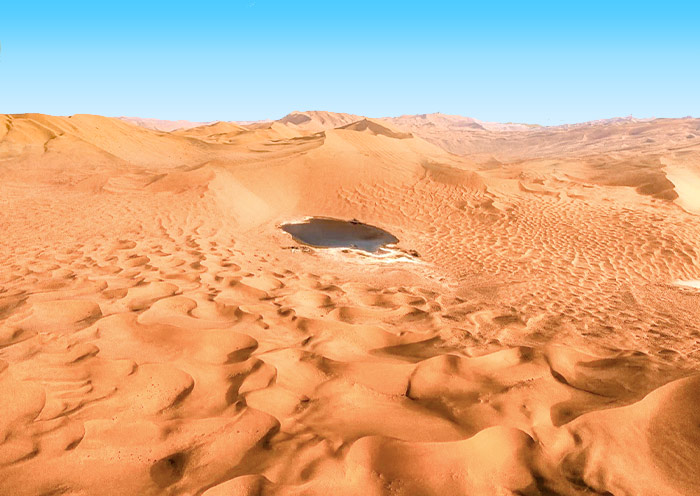
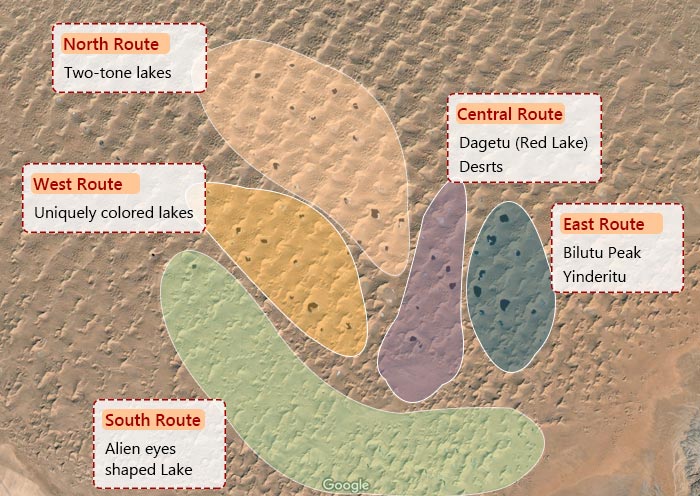
- Badain Jaran Desert East Route: This path features legendary lakes like Yinderitu and Temple Lake, known for their vivid and intensely saturated colors.
- Badain Jaran Desert Middle Route: Lakes are nestled among massive sand peaks here, including the famous Red Lake of the Badain Jaran.
- Badain Jaran Desert North Route: This area is dotted with two-tone lakes, offering spectacular views from the sand dunes above.
- Badain Jaran Desert West Route: Home to a variety of uniquely colored lakes, ranging from deep blues to striking reds.
- Badain Jaran Desert South Route: The southern lakes are distinctively shaped like alien eyes, adding to the area's otherworldly feel.
Bilutu Peak - The Tallest Stationary Sand Dunes in The World
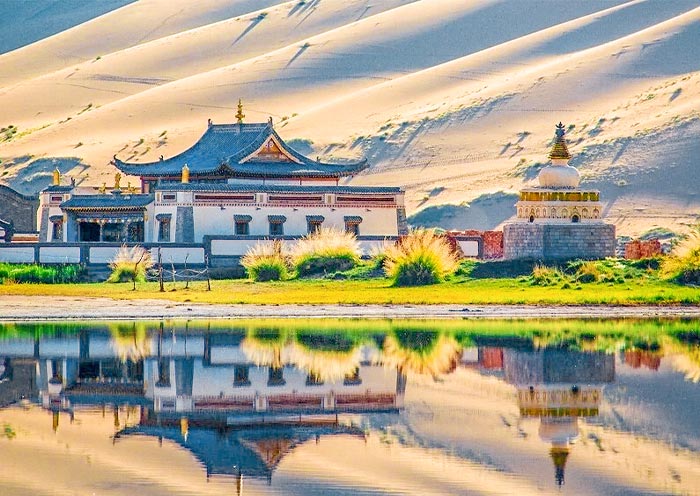
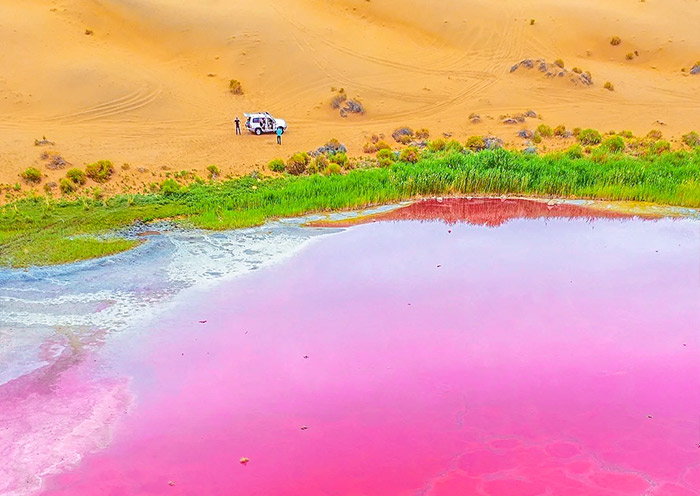
Bilutu Peak isn't just another dune in the vast Badain Jaran Desert—it's a record-breaker, standing proud as the tallest stationary sand dune on the planet. At a whopping 500 meters (that's about 1,640 feet!), it towers over Africa's tallest dunes by a good 70 meters. It's no wonder it's been dubbed the "Everest of the deserts."
Climbing Bilutu Peak? It's not for the faint of heart, but it's an absolute thrill. Imagine standing at the summit, with 360-degree views that stretch out over endless sand dunes, spotting the famous seven inland lakes and some seriously cool geological features. The contrast between the golden sands and the shimmering blue lakes is nothing short of breathtaking. It's a photographer's dream and a nature lover's paradise.
Badain Jaran Temple - A Well-Preserved Ancient Desert Temple
Venture into the heart of the Badain Jaran Desert and discover the Badain Jilin Temple, a historical Tibetan Buddhist monastery that has stood the test of time. Over 150 years old, this remote temple has served as a spiritual oasis for the desert community. Imagine the challenges faced by the builders who transported every brick, stone, and piece of wood across the desert by camel to construct this remarkable place of worship.
Baori Taolegai – World's Largest Echoing-Sand Mountain
One of the coolest quirks of the Badain Jaran Desert has to be its singing sand dunes. Yeah, you heard that right—these dunes literally sing! When the wind picks up or you stroll across the sand, it sets off this eerie yet fascinating musical sound. The star of the show is Baori Taolegai, a massive dune perched on the desert's edge, towering over 200 meters high. When the breeze hits just right, you can hear its song miles away. And get this – even running your fingers through the sand can create a zippy little sizzle. It's like the desert is putting on a concert just for you!
Best Ways to Explore Badain Jaran Desert

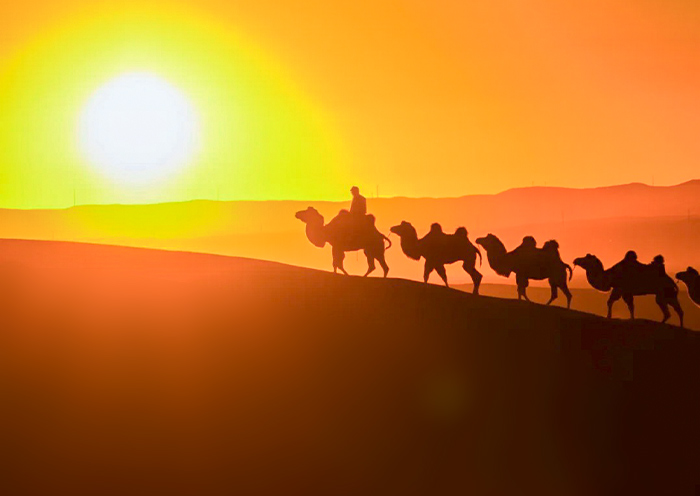
1. 4x4 Jeep Tours – Top Recommendation
A 4x4 vehicle is essential for navigating the rugged terrain of the Badain Jaran Desert. Jeep tours allow you to cover vast areas of the desert, reaching remote lakes and dunes that are otherwise inaccessible. Plus, you get the thrill of dune bashing! For instance, you can conquer Bilutu Peak, standing at the highest point in the Badain Jaran Desert and soaking in the spectacular desert vistas. Prices for a 4x4 vehicle typically range from 2,000 to 4,000 yuan (308-615 USD), and exploring the Badain Jaran Desert by jeep generally takes about 2 days.
2. Camel Trekking
For a more traditional and immersive experience, consider camel trekking. Near Lake Badain, you can hop on a camel and slow down to the pace of the desert, truly soaking in the sights and sounds. This authentic nomadic adventure can last from a few hours to several days, often including overnight camping under the stars for a real nomadic vibe.
3. Hiking
For the adventurers out there, there's no better way to explore the Badain Jaran Desert than on foot. Depending on your fitness level, you can choose to trek famous dunes like Bilutu Peak or just a shorter stretch. A full traverse of the Badain Jaran Desert might take about 9-15 days, covering a total distance of 240 kilometers.
How to Navigating the Badain Jaran Desert
Wondering how to navigate the vast expanse of the Badain Jaran Desert and catch all its highlights—from the stunning dunes and lakes to the sacred springs and temples? Typically, a thorough exploration of the Badain Jaran Desert takes about 1-2 days. You'll start from Badain Town and then travel from east to west, soaking in all the desert has to offer.
Here's a cool 2-day itinerary for hitting the high points of Badain Jaran:
Day 1: Badain Town - Badain Twin Lakes - Dagt (the gorgeous Red Lake) – Yinderitu - Bilutu - Sumin Jilin (Overnight in Sumin Jilin)
Day 2: Badain Jaran Temple - Noritu - Mingsha Bay - Geological Park - Badain Town
Badain Jaran Desert Location: How to Get to Badain Jaran Desert?
Where is Badain Jaran Desert Located?

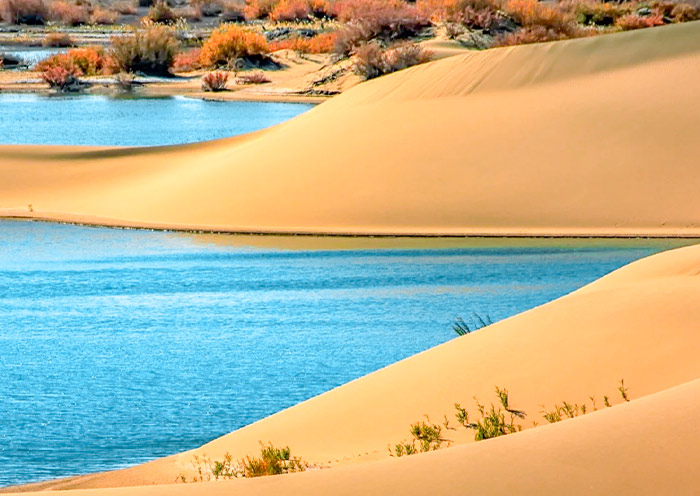
The Badain Jaran Desert is situated in the north-central part of China, primarily within the Inner Mongolia Autonomous Region. It extends into Gansu and Ningxia provinces, making it one of the largest deserts in China.
Geographically, the Badain Jaran Desert is bordered by the Alxa Plateau to the north and the Hexi Corridor to the south. It's nestled roughly between the cities of Zhangye to the south, which is in Gansu Province, and Alxa Zuoqi (Alxa Left Banner) to the north in Inner Mongolia.
The Badain Jaran Desert is just a hop, skip, and a jump away from several key cities in the region.
- From Jinchang in Gansu: 110-kilometer, 2.5-hour drive.
- From Zhangye: 215-kilometer, 3 hours
- From Jiayuguan: 440 kilometers, 5 hours of driving.
- From Dunhuang: 800+ kilometer, 9-hour
- From Yinchuan in Ningxia: 575 kilometers, 7 hours.
How to Get to Badain Jaran Desert?
Right now, there aren't any direct flights or trains to the Badain Jaran Desert. The closest town is Badain Jaran Town, about 75 kilometers away, which is part of Alxa Right Banner in Inner Mongolia. All roads (and plans) to explore the desert lead here. Typically, you'll need to make at least one transfer to get to Badain Jaran Town. The most convenient transfer cities are Zhangye and Jinchang. From there, it's about a 3-4 hour drive from Zhangye and roughly 1.5-2.5 hours from Jinchang.
- From Zhangye to Badain Jaran Desert
Heading out from Zhangye's train station, you're just 220 kilometers away from the stunning Badain Jaran Desert. It's a drive that'll take you about 3-4 hours. Zhangye is wonderfully connected to several key Silk Road destinations like Xi'an, Lanzhou, Dunhuang, Jiayuguan, Xining, Urumqi, and Turpan. Plus, you can easily catch a train to Gansu's Lanzhou, Jiayuguan, or Jinchang and then hop on a connecting ride to get to Badain Jaran Town.
- From Jinchang to Badain Jaran Desert
Jinchang is your closest urban gateway to the breathtaking Badain Jaran Desert, sitting just about 110 kilometers away. You're looking at a sweet 1.5 to 2.5-hour drive to get there. So, if you're itching for a quick desert escape, Jinchang is your perfect starting point.
Jinchang, while a bit quieter than Zhangye, has a solid link to key spots in Gansu like Lanzhou and Jiayuguan.
Best Time to Visit Badain Jaran Desert
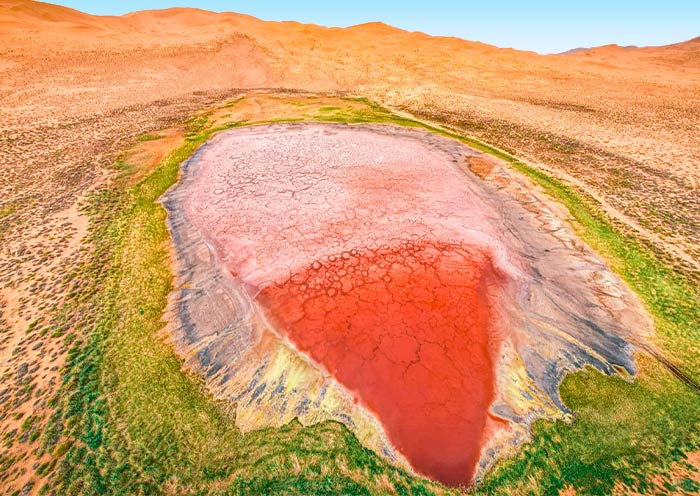
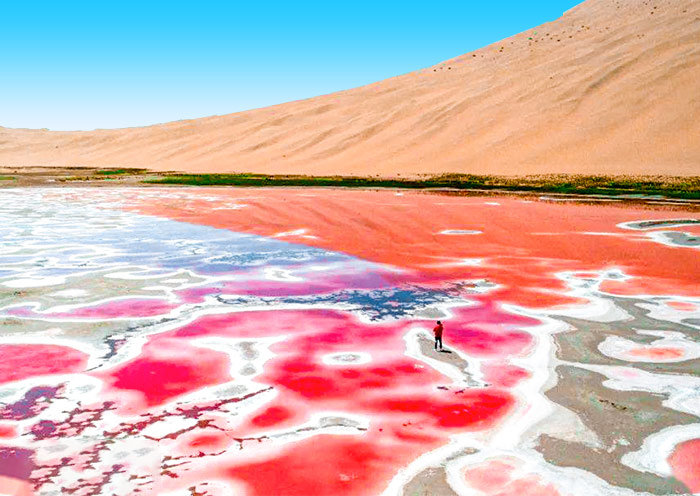
The optimal time to visit the Badain Jaran Desert are late spring and early autumn, specifically from May to June and September to October. During these months, the weather is comfortably warm, avoiding the extreme heat of mid-summer and the biting cold of winter.
This mild climate makes it ideal for exploring the vast dunes and stunning lakes without the discomfort that comes with temperature extremes. Additionally, visiting in these months means you'll experience fewer tourists and clearer skies, perfect for photographing the desert's dramatic landscapes.
Whether you're planning to scale the towering sand dunes, camp under the stars, or explore the mystical lakes, these months provide the best conditions for a full and enjoyable desert adventure.
Where to Stay When You Visit Badain Jaran Desert
When you're touring the Badain Jaran Desert, you can either camp out at designated spots in the desert or stay with local families for a more authentic experience. If you're looking for comfier digs, the nearest hotels and guesthouses with better facilities are just a stone's throw from the desert itself.
Badain Jaran Town: Located within Alxa Right Banner (Alxa Youqi), Badain Jaran Town is the closest urban settlement to the desert and serves as a practical base. Here, you'll find basic hostels and guesthouses that cater mostly to local travelers and adventurers looking to explore the desert.
Around Lake Noritu: Lake Noritu is a famous lake nestled within the Badain Jaran Desert, and the area around it offers a few options for accommodation and camping. It's a great spot if you're looking to stay close to the serene waterfront and enjoy the unique desert lake scenery.
Near Sumin Jilin Lake: This is a popular spot for accommodations in the Badain Jaran Desert, conveniently close to the Badain Jaran Temple. If you're planning to explore this iconic desert temple, staying near Sumin Jilin Lake can add some extra convenience and charm to your visit, letting you soak up both spiritual and natural beauty of the area.
How to Plan a Badain Jaran Desert Tour
Desert Camps and Eco-Lodges
Scattered throughout or on the fringes of the Badain Jaran Desert are several desert camps and eco-lodges. These spots typically offer tent accommodations or cozy cabins, providing a chance to stay right under the stars amidst the sand. It's a perfect pick for those wanting to get up close and personal with nature and really dive into the desert vibe.
Staying with Local Families
You might consider a homestay with a local family in one of the small villages near the desert. This approach allows visitors to learn directly from locals about their culture, cuisine, and way of life—an authentic peek into the daily life surrounding the desert.
Camping
For the adventure seekers, packing your own camping gear and setting up in designated areas of the desert is a budget-friendly and thrilling way to experience the Badain Jaran Desert. This option offers flexibility in your travel schedule and a deep connection with the stunning natural surroundings.
How to Plan a Badain Jaran Desert Tour
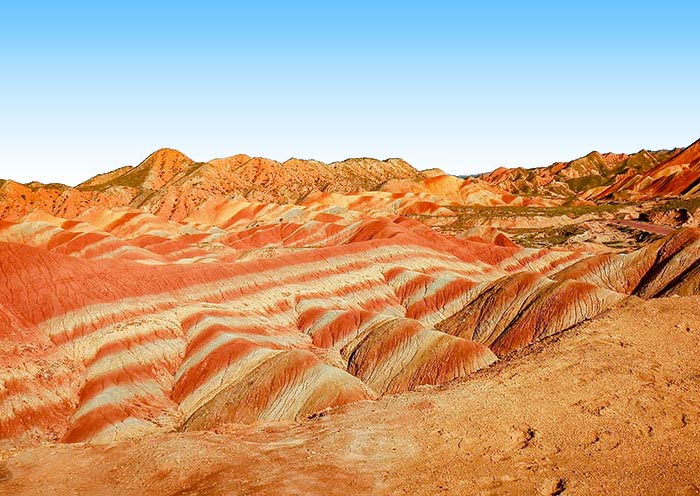
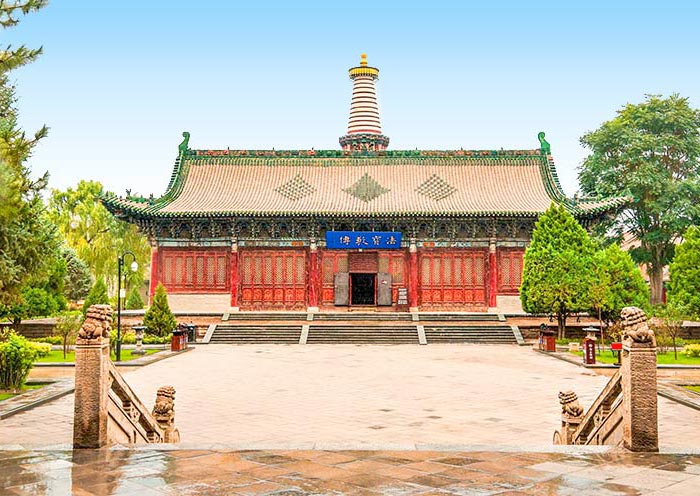
Typically, a jeep tour through the Badain Jaran Desert takes about 2-3 days. Highlights include some of the desert's most stunning lakes like the popular Dage Lake (Red Lake) and Indertu Lake (Magic Spring), as well as the tallest sand peak, Bilutu Peak, and the Badain Jaran Temple.
If you're up for a more intense adventure, consider trekking across the desert, which can take anywhere from 8-13 days.
Zhangye in Gansu is currently your best bet for getting to Badain Jaran, making it a convenient gateway city. Why not combine your desert trip with some time exploring Zhangye and nearby Qinghai? You could easily fill 7-10 days soaking in the sights of these iconic destinations.
Here is a itinerary you can refer to:
Day 1: Arrival in Dunhuang
Day 2: Dunhuang Tour - Visit the Mogao Caves, a UNESCO World Heritage site, then head to the Singing Sand Mountains and Crescent Lake.
Day 3: Dunhuang to Jiayuguan - Travel to Jiayuguan to see the Overhanging Great Wall, the Jiayuguan Pass (part of the Great Wall UNESCO site), with an optional visit to the Great Wall Museum.
Day 4: Jiayuguan to Zhangye - Visit the Great Buddha Temple in Jiayuguan before heading to Zhangye to explore the Zhangye National Geopark, known for its stunning Danxia landforms.
Day 5: Zhangye to Badain Jaran Town - Travel to Badain Jaran Town, stopping at the Pingshan Lake Grand Canyon along the way.
Day 6: Badain Jaran Town to Badain Jaran Desert - Experience the majestic Badain Jaran Desert.
Day 7: Departure from Badain Jaran Town
